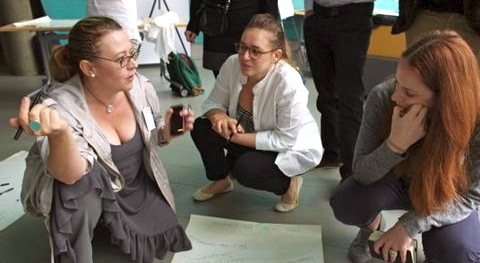
I am looking forward to #LOTE2. Some of the most interesting people I know are coming: as if that were not enough, we are also coming up with a really great, interactive, no-spectator-allowed program. My favorite part is the Policy Hero Challenge: the idea is to take up some of the recommendations generated by the Edgeryders project and hammer it into policy. Real, solid, compliant, accountable, honest-to-God policy; the stuff that could be put before Parliament, or just be signed into existence by a senior bureaucrat as is. Of course citizens – even very smart ones – typically cannot do that. So, we are deploying professional policy makers in each session. They are tasked with not allowing the session to be simplistic.
Let me give you an example. We have a session on rewiring innovation policy. Edgeryders think innovation policy in Europe is missing the opportunity to support innovative people, as it simply can’t see beyond organization. So, how would innovation policy that targets individuals look like? I can imagine the conversation starting like this:
CITIZEN: “Governments only like to give big money to big tech companies. Everybody knows these are not the most innovative players! I mean, Dilbert works for a large tech corporation. Are you really giving taxpayer euro to Dilbert’s boss to innovate?”
POLICY MAKER: “Not so fast. We are required to account for every penny, and that is a good thing. Large organizations can show us how they spend taxpayer money: they have sophisticated accounting systems and they own large assets – so, if they don’t deliver, we can always sue them and get the money back. For example, in 2009 there was a really nasty episode with some small firms that put together a scam […] Of course, if we had reliable ex ante project quality indicators, we could take more risks on the accounting as long as we would be supporting the best projects, but measuring the quality of an innovation project a priori is a very hard problem. Here’s why […].”
It boils down to this: if you want to make policy, you have to take on board its full complexity. A dumbed-down version just won’t work: at least, I can’t think of any way to do this without treating everyone as an intelligent adult, and demanding everybody behaves like one. And when you think of it this is a really beautiful idea. It demands full honesty and transparency from policy makers; intellectual rigour and hard work from citizens; and mutual respect from everyone. It brings out the best everyone has to give. And it might work.
I am really, really curious to run the experiment, and very proud. I am proud of the Edgeryders community for making the effort (God knows many of them are broke, and investing time and money to come to Brussels to have this kind of discussion is a really generous gift); proud of our policy makers, Prabhat Agarwal and his colleagues at the European Commission’s DG Connect, Justyna Krol and her unit at UNDP-CIS, Anna Maria Darmanin at the European Economic and Social Committee, Amelia Andersdotter at the European Parliament; super-proud of my colleagues at the Council of Europe – Gilda Farrell, Nadia El-Imam, Malcolm Cox, Noemi Salantiu, Andrei Trubceac, Joel Obrecht – for supporting the event even though it is not an official Council of Europe one.
And I am proud of you all, my fellow humans, so well represented by the wonderful people at #LOTE2. After all of the screwups in the long, bloody history of what we today call government; after all the false starts, broken promises, bogus ideologies, visionary leaderships betrayed by mediocrity (and don’t even get me started on the really heavy stuff of Gulags and secret police), it looks like we are still smart enough to look truth in the eye; strong enough to forgive each other; and crazy enough to try again, and even think that, this time, we might get it right.
If you want to participate to #LOTE2, read this.
Thank you Alberto. And don’t forget Asta Helgadottir, Matthias Ansorg, Kat Borlongan, Matthias Bjarnemalm, Caroline Paulick-Thiel, Anthony Zacharzewski, Vinay Gupta, Laia Ros, Philippe Verstichel, Andrea Paoletti, Karen Wohlert, Elena Gapich, Caroline Paulick-Thiel, Adria Florea, Ilaria D’Aura, Eimhin Shortt, Michal Wozniak, Asta Helgadottir,Thomas Goorden, Dante Monson-Gabriell, Mike Gogulski, Rebecca Collins and Isabelle Heureux.
Ho ripreso il tuo articolo per intero qui:
http://www.audeo.it/blog/blog/cosa-vuol-dire-smart-in-smart-cities/
Citando ovviamente fonte e autore.
Se ci sono problemi lo rimuovo immediatamente.
(scusa ma non ho trovato un modo per contattarti direttamente)